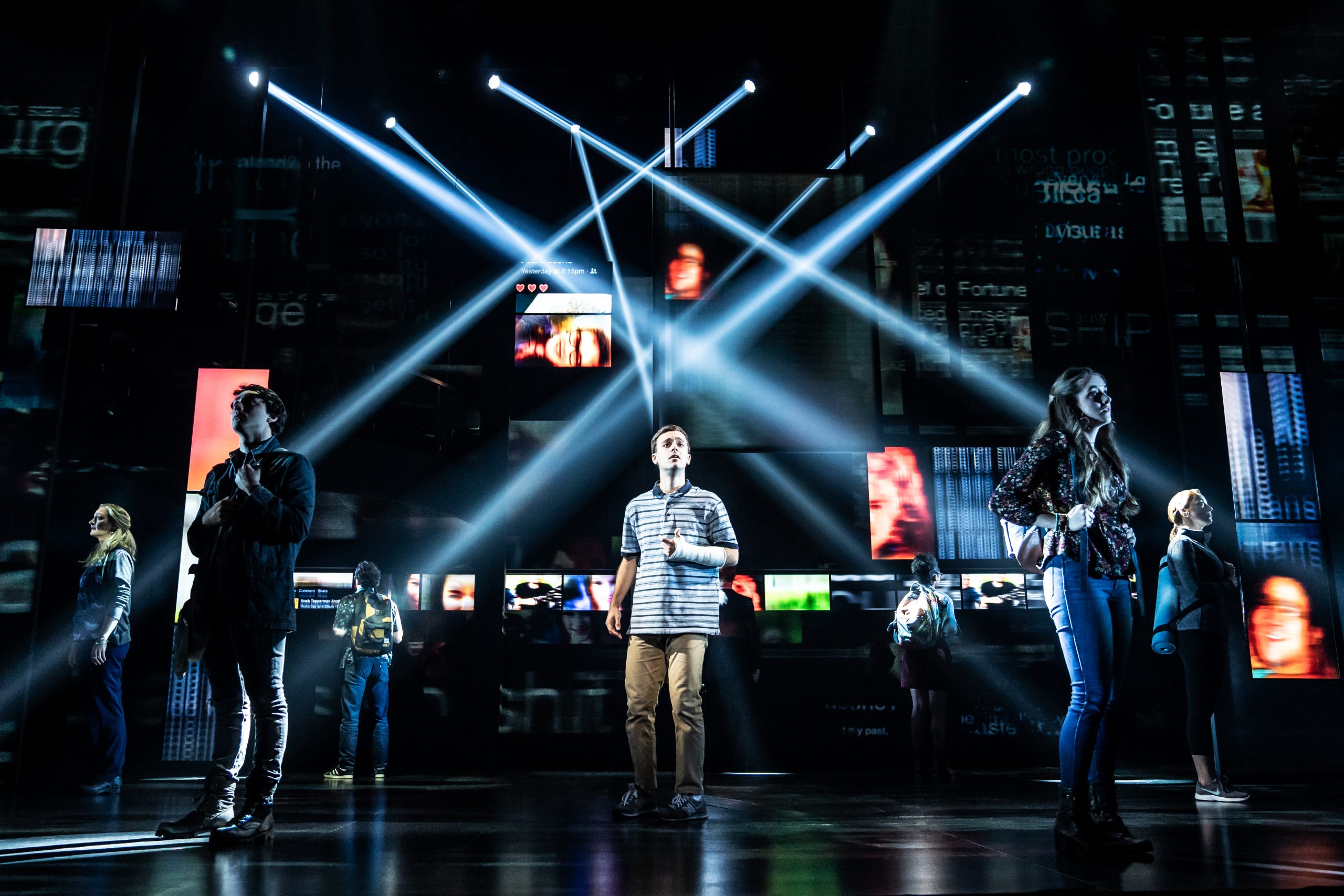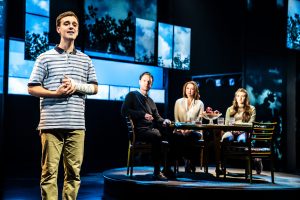
Dear Evan Hansen – Courtesy of Matthew Murphy. Used with permission.
“Dear Evan Hansen,” which has been declared “One of the most remarkable shows in musical theatre history” by The Washington Post, makes its Indianapolis premiere at Old National Centre April 26 – May 1. Presented by Broadway in Indianapolis, the musical features a book by Tony Award-winner Steven Levenson (Fosse/Verdon), a score by Grammy, Tony, and Academy Award-winners Benj Pasek and Justin Paul (“La La Land,” “The Greatest Showman”) and direction by four-time Tony Award-nominee Michael Greif (“Rent,” “Next to Normal”).
“Dear Evan Hansen” follows Evan Hansen, a 17-year-old bullied, high school senior with social anxiety, who fabricates a role in a tragedy that is a deceit.
Playing the role of Zoe, who is the sister of Connor Murphy, a classmate of Evan’s who is at the center of the tragedy is Stephanie La Rochelle, and in the role of her father, Larry, is John Hemphill. Recently, I caught up with the two actors in a Zoom call from their hotel rooms in Rochester, New York, a stop on their 40-city national tour. Below is an edited transcript of our conversation.

Stephanie La Rochelle – Courtesy of Broadway in Indianapolis. Used with permission.
How have audiences been thus far?
JH: We’ve had really excellent audiences, which has been great.
SL: I actually got a message from someone saying how grateful they were to see live theatre again and it was their first time back since the pandemic. It is really special. It’s such a sacred place and it is really special to have that.
Tell me about your role, John.
JH: As his parent, it’s a story about how to navigate the grieving process and the Murphy family becomes close with Evan throughout the musical. There are wonderful relationships that are created because of Evan, but unfortunately, they fall apart a little bit. I play the father figure of the story.

John Hemphill – Courtesy of Broadway in Indianapolis. Used with permission.
How do you like playing the role?
JH: I love it. I think it’s complicated. I think I understand so much of what Larry is going through, especially his limitations on how he understands what being a father is in this day and age. As an actor, I try not to apologize, necessarily, for a character, but live through the character’s truth and because of some of Larry’s limitations, as far as how he can approach as a parent, it is interesting to play and to make sense of. I still strive to understand the character.
Are you a parent yourself?
JH: I’m not a parent. I am a parent to a 100-pound golden retriever, Norman, which is a whole different set of complications.
It’s a very emotional story. How do you let it go of it after performances?
SL: Yes, it is a very emotional piece, pretty heavy. We’re very lucky that offstage, we’ve got a lot of funny people that sort of lift the spirit, so we’ve got a good balance, all in all.
Tell me about singing the score.
SL: It’s such a gift to sing that music every night. The writers did such a good job of making the songs. They’re not what you would traditionally hear in a musical. They are very sort of “pop forward” and very catchy. And the orchestrations are some of my favorites. They are absolutely beautiful. It is such a privilege to get to sing this music every night.
Does this musical have special meaning, considering all we have been through of late?
JH: Absolutely. It was only enhanced by all the isolation people felt during COVID. I think what is exceptional about this story and this show is it shines a light on challenges of mental health, sustaining strong mental health in this period of social media, which is very challenging for young people. We had a talkback three weeks ago with a group of mental-health workers and people who have been touched by challenges of mental health. It meant the world to them that we were telling this story, both from the perspective of youth, as well as the perspective of the older generations who are parenting. It certainly was impactful before COVID and I think during and after, it is even more so.
A number of celebrities are talking about their own mental health issues.
SL: That’s one thing I love about this show that it’s helping to erase the stigma of mental health. It’s inspiring people to talk about their story.
How does social media play a part in the show?
JH: It highlights some things that can go viral that can be damaging, but I certainly think our show highlights social media in its usefulness. What we are doing really helps people connect. I know it did, for me, for sure.

Dear Evan Hansen – Courtesy of Matthew Murphy. Used with permission.
How do you like touring? What is that life like?
SL: It’s exciting. We haven’t been spending more than a week in each of these cities, and a lot of them…I’m Canadian…a lot of these cities, I had not even heard of before, so I get to explore this country. It’s also really great to be able to bring this story to people who don’t have access to see it in NYC.
What do you like to do when you visit different cities?
SL: I think we all like to explore a little bit. Our schedule allows for us to have free time during the week, and we have four show weekends. Wednesday through Friday, I like to go for a walk and explore the cities.
JH: Yes, I think it’s important to get out and important to be connected with where you are. This affords us the opportunity to do that, to go and experience different places and people and I think that is one of the highlights of what we are doing, what we get to do. I am a golfer, so I like to go golfing in each city we go to and that gets me out into the countryside, which is really fun for me to.
COVID doesn’t allow stage-door meet-and-greet opportunities with your fans, right?
SL: Unfortunately, not. I do receive messages on social media, however, and they are always filled with so much gratitude. People are always so grateful to see this show and impact them the way it does. Like we were saying earlier, it allows them to feel free to share their story and feel found, like the song, “You’ll be found.” Thank you for sharing this story.
Have you heard from those who have experienced tragedy like what’s portrayed in the show?
JH: Absolutely. That happens often. It’s very moving. It’s something. Steph said gratitude and I think that’s something…not important…but it sheds a light on us telling their story. It’s not our story. We are sharing a story, but it ends up being their story. When they see it and they see they are represented and heard, it becomes quite emotional for them. I am getting a little emotional just thinking about some of the conversations I’ve had.

Dear Evan Hansen Courtesy of Matthew Murphy. Used with permission.
And have you heard from parents? What do they say?
JH: Yes, I have. Most of it is just, “Thank you.” I live what you just lived through. I live it in real life. There is compassion in seeing your story on the stage and there is a sharing I think they get when we tell this story. I recall a talkback from before COVID, when a…it was someone who had dealt with it and wasn’t ready to unpack how this story connected to their own experience, and in fact, they said, “I am going to need to take time to reflect on this and how I connect with it.” I thought that was important to be able to spend time, for anyone who is younger or of parenting age, to be able to take the time to reflect on their own life with the story we are telling. Some things will fit, some things won’t. Some things, you gain perspective on. Other things, you might disagree with, saying, “That wasn’t my experience,” but in all of that is a discussion. I think if people are able to start a discussion, or feel if they have an outlet, that’s what’s important about this.
Stephanie, have you heard from any siblings?
SL: Yes, not recently, but a while back, I remember receiving a message from someone who went through the same experience, and they felt overshadowed by a sibling and they were just very grateful to see their story on stage.
Anything in your experience with a sibling that you relate to?
SL: I have a younger sister, but I don’t think there are any similarities. I think I connect to Zoe on a personal level. She’s a junior in high school and really isn’t fazed by the high-school experience. She is not really interested in the status quo of it all. She does her own thing. She’s a very independent young lady and I can definitely relate to that. I think it is really special to be able to play such a strong female character.
Were you that way in high school?
SL: Yes, I would say so.
Are audiences surprised with the musical’s story?
SL: A lot of people are very familiar with the cast recording, and very connected to that, and they see the musical and maybe had a very different idea of what it would look like. We try not to give too much away. We want to keep the surprise element.
Any negative feedback?
JH: It’s almost the opposite because, to be honest. It’s been a very popular show. I think people are surprised by how funny…yes, it is emotional, but it’s really funny and they are also surprised by how moved they are and excited by the music. Our band is right there, floating above the stage, and they are so good. And having that live feel of those musicians right there is incredible. I think a lot of people are knocked out by that too.
Ultimately, what can people expect to see?
JH: They can expect to see a charming, emotional story that has a lot of humor, but certainly don’t forget your tissues. I think what they will be left with is a feeling of hope and a message of hope. If they can leave with that, we’ve done our jobs.
“Dear Evan Hansen” tickets are on sale and available now at ticketmaster.com. Groups of 10 or more may call 317-632-5183. The performance schedule will be Tuesday-Thursday evening at 7:30 p.m., Friday and Saturday evening at 8:00 p.m., Saturday matinee at 2:00 p.m., Sunday matinee at 1:00 p.m. and Sunday evening at 6:30 p.m.





